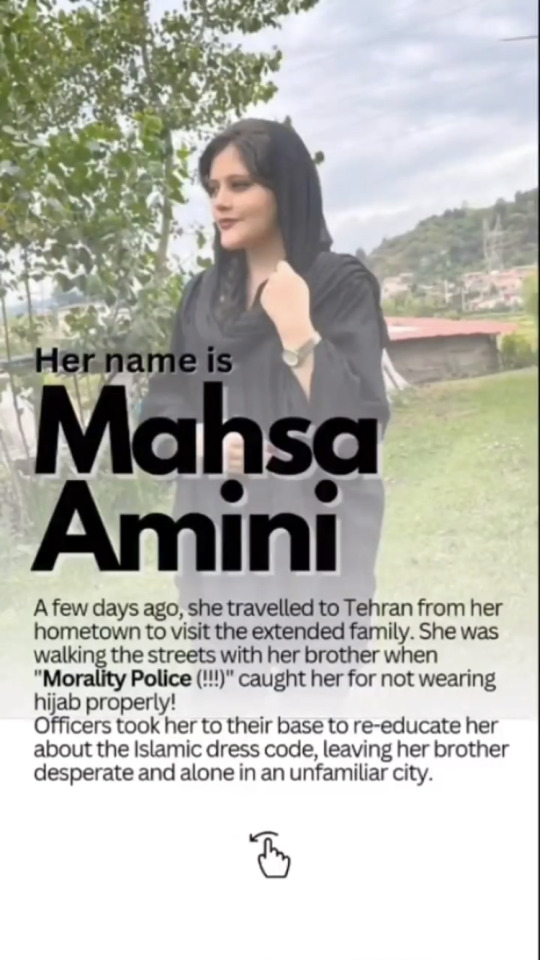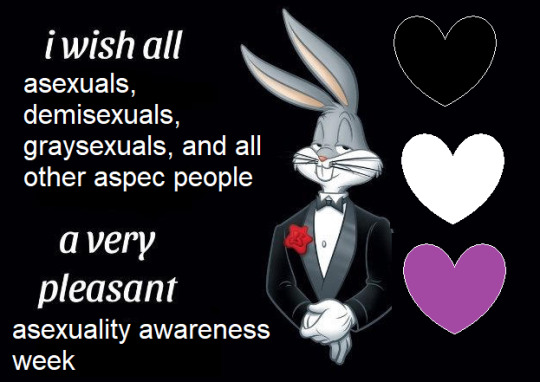Text
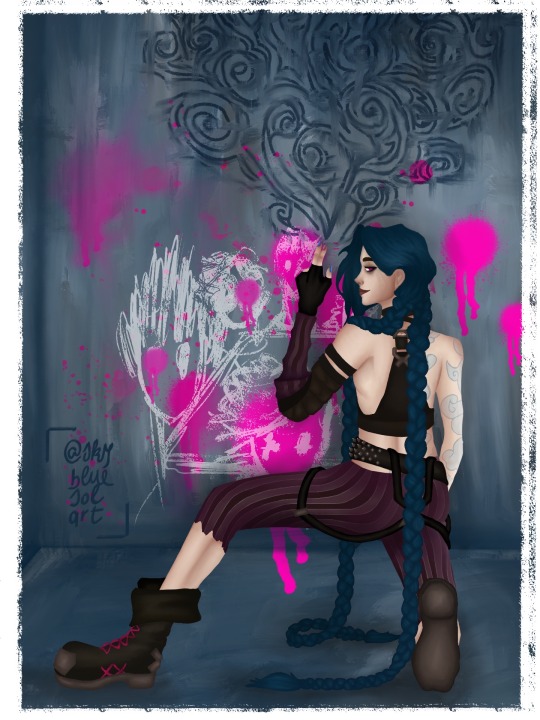
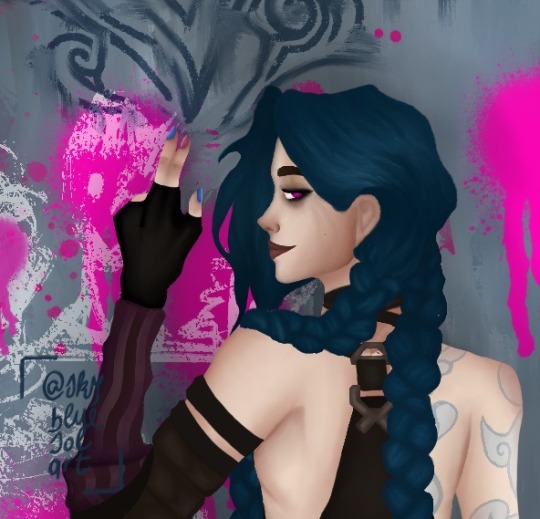
The price of friendship.
And also the price of my sanity. This piece has a tracked time of 48 hours.
#art#artists on tumblr#digital art#artist#digital illustration#fanart#digital artist#digital painting#procreate#artistic#artwork#fanartist#procreate art#arcane jinx#jinx#jinx fanart#arcane#arcane league of legends#arcane fanart#jinx arcane
20 notes
·
View notes
Note
i was rewatching some of adora and catra's moments together from when they weren't enemies that probably were meant to show you the more positive side of their friendship (the first episode, the "promise" episode, the fake portal reality) and I don't really know how to express it but it seems to me like the writers were trying way too hard to portray them as this super close wholesome duo and make them have chemistry. It feels like these were supposed to make you root for their reunion by showing how fun and cute they are together and how different Adora is with Catra from how she is with everyone else (she is way more teasing and snarky and starts a lot of playful fights with her) but it never made me feel anything, it felt... shallow. I dunno I just think it would be better to give them some more meaningful interactions, have them be vulnerable or affectionate around each other instead of all this non-stop laughter and friendly bickering... I am not saying its bad but with all the toxicity between them all the time those scenes are kind of annoying to watch like I just don't buy it
“have them be vulnerable or affectionate around each other instead of all this non-stop laughter and friendly bickering”
You said it!
It's also a wonderful point of comparison between Adora & Catra friendship and the Best Friend Squad friendship, which marks the latter as being much healthier.
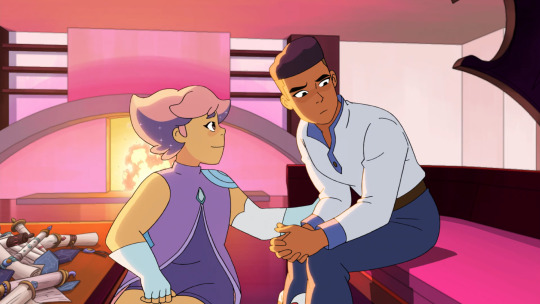
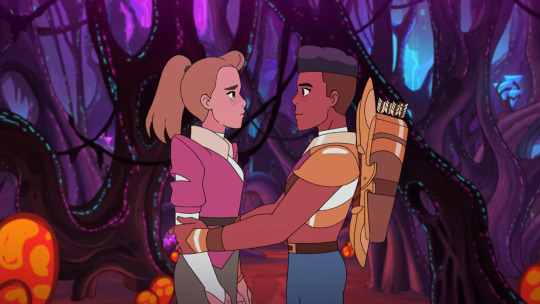
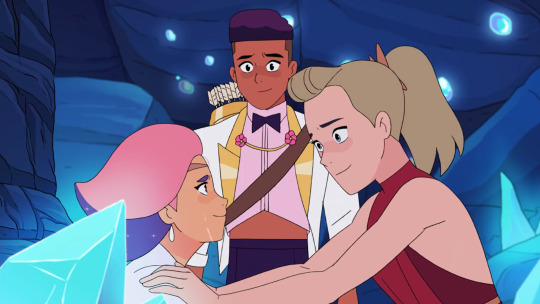
With BFS, there are tons of scenes where one of them is vulnerable and gets comforted by their friend. They don't just enjoy hanging out together (although this is also necessary), they support each other. They can rely on each other.
With Catr*dora, the only time I can remember that happening pre-defection is the promise flashback itself.
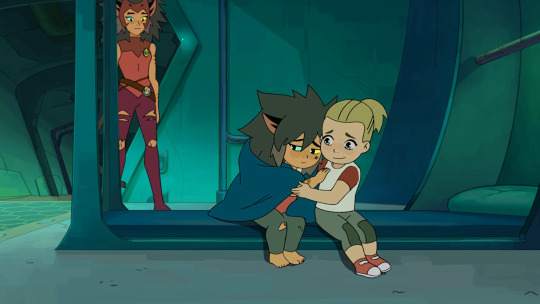
Keep in mind that they are both very young children in this. Another flashback within the same episode shows presumably tweenage Catra being upset after she lost, but instead of letting Adora know that, she plays it cool:
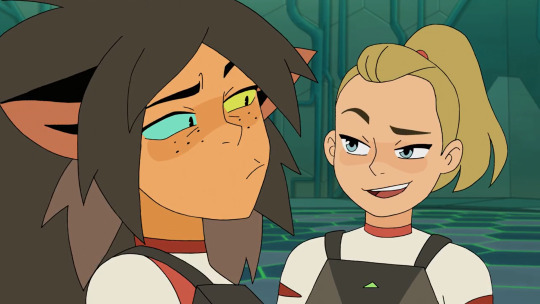
[Did I hurt you?] “No! I'm fine. You're just lucky I let you win.” [Riiight.] “I'm serious! If I come in first, people might expect me to actually start doing things around here. Trust me, second place suits me just fine.” [Yeah, okay.]
And goes off to cry in a bathroom, alone.
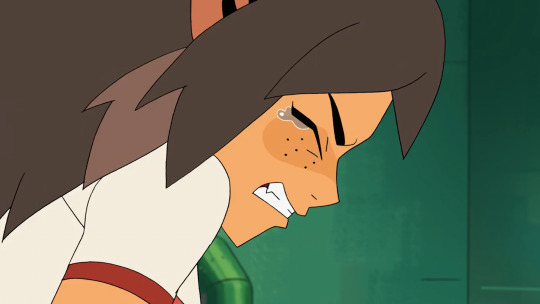
In fact, the first serious scene we get between them already establishes that Catra is hiding her true feelings from Adora:
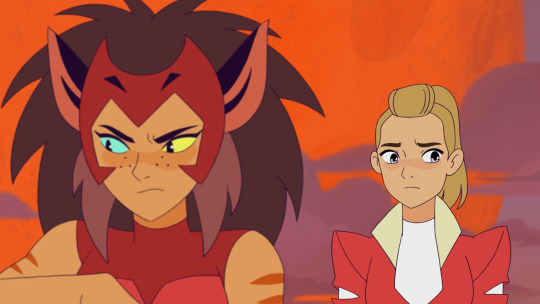
[Look, I'm sorry. I didn't even think you wanted to be a Force Captain.] “I don't. Here, take your stupid badge.”
…
“And I'm a better Force Captain than you would've ever been!” [You always said you didn't care about things like that.] “Well I was lying, obviously!”
As Catra grew older, she began to think that vulnerability is weakness and Adora's kindness is actually condescension, so of course she wouldn't go out of her way to get it — the consequences of this mindset span the entire show. All while Adora had no way of knowing her friend is growing more and more distant when it seems like nothing is wrong.
(And it goes without saying but Adora was definitely not comforted by Catra at any point in her life.)
Their friendship feels shallow because it is. They goof around and have inside jokes and could probably tell you the other's favorite number but none of that substitutes actually understanding who someone is as a person. Catra doesn't realize Adora is compassionate and misreads it as being arrogant. Adora doesn't realize Catra is insecure and misreads it as being a sore loser.
They don't truly know each other.
Yet rather than address this, Season 5 makes them go back to more or less the exact same relationship. Still not getting where the other one is coming from, still having dramatic fights instead of properly communicating. One improvement is that Catra now allows herself to be comforted, because figures the writers believe this is the only real problem here.
88 notes
·
View notes
Photo

Little Snake 🐍
No gloves because I realised he had gloves once I finished shading the hands, and honestly... I was too proud of that shading to cover it up.
#errant kingdom#ek#lunaris games#visual novel#visual art#visual novel game#visual novel fanart#art#artist#artworks#Fanart#fanartist#errant kingdom fanart#raiden#errant kingdom raiden#lunaris games raiden#digital art#Digital Illustration#digital artist#artists on tumblr#procreate#procreate art
18 notes
·
View notes
Text
I was thirteen and had a distinct lack of creativity:
My name is Sol, which means sun in Spanish. The sun is in the sky. The sky is blue. Voilà, skybluesol. In some iterations of this account (such as Instagram and Twitter) I also add an “art” to the end, because, well, I’m and artist?
As to why I still stick with it... not only have I signed all of my art (still out there in The Internet) with this name, but it also has a nice ring to it, however stupid the breakdown may be. And I got attached, what can I say.
How’d you come up with your URL? I wanna know, these things always have fun stories behind them. If yours is a song lyric or a quote, tell me why you picked that one in particular. Why did it stick out to you?
13K notes
·
View notes
Text
first day of class today and my calc professor ranted about newton's childhood trauma, mercury poisoning, and her theory on how he created calculus out of spite
we're all trauma-bonded to newton by learning calculus
562 notes
·
View notes
Text
the virgin lore olympus vs the chad hades thread on twitter is genuinely one of the most embarrassing things ive ever seen
11K notes
·
View notes
Text
212K notes
·
View notes
Text
— friends to lovers things that make my heart flutter
knowing each other's favorite everything since the beginning...
being each other's home away from home
or spending days obsessively trying to figure out the other's taste and personality if they met later on
"my house is your house and you know you're always safe here"
growing together, then growing apart, then rekindling the flame years after like no time passed
"this reminded me of you and of course I had to show it to you"
silly childhood memories that both of them never forget and always chat about
their song, that happened to be whatever was on the radio/tv the first time one of them hung out at the other's house
sharing goals and dreams for the future and secretly hoping for something more
always being gentle and kind because they know what the other has been through, never forgetting their fears and insecurities
"damn, it's like my mom likes you better than me"
unspoken rules and inside jokes that no one else understands
2 a.m. phone calls when one of them can't sleep so they just comment whatever show is on the tv at that hour over the phone and suddenly it's morning again
"my mouth is sealed, you know you can tell me anything"
everyone always thinking they're high school sweethearts and one of them immediately arguing that platonic soulmates are a real thing and they should leave them alone...
but internally fearing that the relationship is only platonic because they want more
a confession that's a bit too honest every now and then but so what? they never notice.
WHEN WILL THEY NOTICE
but if they do notice... what if it ruins everything?
followed by months and months and months of conflicted feelings that only their smile eases
4K notes
·
View notes
Text
“Writing all Races Equally”, Problems Inherent In That Attitude
@missdrarrydawn asked:
Hi! I recently joined a very diverse writing group in order to learn more about other races and ethnicities from people living those experiences so that I can include diversity in my own writing in a healthy, balanced way, and it has been a lot of fun, but then yesterday there was a conflict which resulted in me getting removed from the group. Most of the POC in the group are from the USA, but I’ve grown up in, and still live in, a small European country, so A LOT of the negative tropes and stereotypes about POC that are deeply rooted in the USA are things that are basically non-existent where I live (mostly because there’s not really any people of color living here). I had always been under the assumptions that POC characters are best written just as regular people with emotions and struggles and relationships etc., not reduced to just their race and treated more special/more negative for the color of their skin. They’re just normal people after all.
My idea had been to write POC characters the same way I would write my white characters, with the same respect and depth and not treat their skin color as something special or exotic or anything like that. However, when I expressed that to the writing group, a lot of the people there got very upset with me, telling me that the way I viewed writing POC was disrespectful and that I couldn’t write any POC characters or POC coded characters the same way as white people because they are inherently different and therefore must be written in different ways. I could see I’d hurt a lot of the other writers from the group, and I tried to apologize but the damage had been done. Now obviously I’m not going to sit here and say they are all wrong and I am right, but I do wonder if this is a widely held opinion, because in my head, all races are equal and I wouldn’t have ever given writing one race more thought or care over another until this experience made me question that.
Is the idea that POC characters have to be written with more care than a white character and treated better or with more respect or thought because of all the racism in real life a stance held by the majority or could this be a product of centuries of racism and oppression that caused a lot of POC people to request that they be written with so much more compassion than anyone else because of frustrations of never receiving equal treatment and finally being sick of it? I do want to clarify though that this wouldn’t apply to writing about a culture or religion, because those are very special and sacred things that I will always do a lot of research on before attempting to write about, here I’m just talking about writing POC characters on their own, not related to a culture or a religion, although I realize as I write this that that might be an issue all of its own, but that’s something for me to reflect on and ask about another day because this is getting really long and I don’t want it to get any longer. I know this isn’t a directlywriting related question and I apologize, but you have an amazing writing blog with a lot of perspective and thought put into it so asking you guys was my first thought after I’d gotten kicked out. Thank you for your time :)))
WWC Note: this ask has been edited down to just the points we’re replying to:
Colourblindness
The attitude you hold is called “colorblindness” and it’s a problem for multiple reasons, the primary one being:
White is not the default emotional experience of the world, and assuming we’re all the same is the biggest way ignorance-based racism persists.
When you begin to assume that everyone has a generally similar life path that’s only faintly informed by race, you ignore everything that shapes a person. You currently view your own white experience as the default that anyone has the potential to live if they have the same class, gender, sexual orientation, religion (including cultural religion), and education as you.
But this is a fallacy, and a person’s race will modify everything they have experienced even if they are identical to you in every other way. You say that you would never disrespect a person’s culture, but even when you live under a single unified culture, you will often create a new culture based off your racialized experience. Race and culture are often interlinked.
The thing about marginalized groups is, we have assimilation pressures. Native people have been forced to live like white people for centuries, and it’s resulted in a lot of bloodshed. A lot of critique of the adoption system is about how white saviour-y it is, and how much trans-racial adoptees (aka, adoptees that are different races and cultures from their adopted parents) suffer either because their white parents refuse to participate in their culture, or assume that because the child of colour is from a white family in a white-majority area, they won’t experience racism because, somehow by the virtue of having white parents, they’ll magically get access to white privilege.
Aka, it’s traumatizing. Very traumatizing. Even if you weren’t directly being assimilated, the trauma just… lingers. It’s generational. Your body remembers, your bloodline remembers.
And the impact of writing colourblind is: a lot of PoC will feel assimilated into white society, when society already tells you that you should assimilate, and it hurts. One of my biggest points in writing diverse characters is: you have to be careful you’re not re-skinning your own values onto a different skin tone. Remember how I said culture and race are often interlinked, even in a diverse area? This is part of it.
Equity vs Equality
There’s a concept in social justice: equality vs equity. Equality forces everyone to be the same, while equity accounts for their differences. This comic illustrates: Equity vs equality vs justice.
For example, equality is having everyone wear the same sized hat. But if you have thicker, fluffier hair (either curly or coiled) then your hair won’t fit in the hat. As a result, many PoC (especially Black) are forced to wear their hair much shorter, because their hair won’t fit in the required hat. This is assimilation
Equity would acknowledge that people have a right to wear their hair however they want, and has multiple sized hats available for people of all different hair textures to wear. They might all be in the same colours or style, so you can tell they’re all from the same place, but they are varied and allow people the freedom of self expression. This is equity that results in actual equality, because it allows everyone the same level of freedom of self expression with their hair.
Intersectionality
Writing from a colorblind perspective is the fastest way to hamstring any research efforts for where to put equity, because you are assuming sameness and therefore not researching. Your assumption when writing any sort of character of colour should be assuming difference, because everyone—white people included—have a racialized experience.
This is the principle of intersectionality: that the mixing of any race with anything else will produce a unique experience. A Black Muslim will experience the world differently than an Arab Muslim, and both will experience the world differently from a white Muslim. A Native woman will experience the world differently than a Persian woman. A white trans man will have a wildly different experience than a Chinese diaspora trans man.
They will share similarities, yes, because people are people and anything shared will produce some sameness between experiences. But if you assume that the white experience is the default, you’ll miss all of those intersections and write something inauthentic. The amount of sameness is probably a lot less than you think of on first pass. And then on pass twenty, you’ll realize a bunch of similarities you probably never considered.
It is not reducing people to their race when you acknowledge that race influences every part of your life. It is respecting their unique experience as a person of colour.
Racial Influence
So yes, it is a commonly held view that you should write characters of colour as being deeply influenced by their race, because their race influences everything about them. This isn’t even getting into how a lot of things white people assume are constants aren’t; emotions, gender, sexual orientation, mental illness* and emotional expressions are all culturally influenced.
Racism has existed for five hundred odd years (since the concept of race was invented for European colonialist ends), but xenophobia has existed ever since people have existed. As soon as you are Other, you have a different experience than the dominant culture. You’ll probably make a new culture, or will have already had a new culture that made you the Other.
Assuming we’re all the same, while it looks kind-hearted, is actually the fastest way to invalidate everyone around you. It closes your ears to hearing about difference. Yes, we are all people, yes we all have feelings and likes and dislikes and interests and we can share many, many, many things. But our relationship to those things will still be influenced by where we came from.
A person who listened to a certain band to survive a terrible time in their life will have a much different relationship to that band than someone whose parents were fans of them so they associate it with happy times. If you can understand the difference between those two people, and realize you should write their internal lives while listening to the same song differently because of that different experience, you can understand the difference that race and culture will produce in response to the same stimulus.
~ Mod Lesya
* a cross-cultural study of schizophrenia showed that in two non-Western cultures (Accra, Ghana; and Chennai, India) auditory hallucinations aren’t seen as scary, and are instead seen as ancestors helping guide. This positive-to-neutral view of voices was not found in the American population of schizophrenics, who universally found the voices bad and destructive, indicating there is a strong cultural component to views of your mental illness even if you experience the same symptoms.
Placing Care
As to why you need to put more care into writing characters of color than you would white characters: it’s not because people of color want to be treated better in fiction out of some sort of affirmative action to make up for the racism we experience in real life. It’s because it’s always more difficult, on a writing skill level, to write about things that you aren’t familiar with, than about things you know well.
This principle applies to a lot of things. If you’re writing a story set in a location you’ve never been to before, it will require you to put in a lot more work to write it accurately than if it was set in your hometown. Same for a story set in a time period you don’t know well, versus a contemporary story. Or for a story about a character who has a highly specialized job you know nothing about.
Skill and Difficulty Levels
Think of it as a difficulty setting in a video game. The more you add variables that you are unfamiliar with, the more you’re raising the difficulty level. Writing a story set in your home town in the present day with characters who share your background and life experiences is playing on easy mode. (There’s nothing wrong with playing on easy mode. In fact, until your skill level increases, I recommend it.) Writing a story set in the 12th century on a different continent with characters who are nothing like you? That’s a lot harder. And will require a lot more effort, and care, and research. If you go about it carelessly, you’re bound to get things wrong, and the story won’t be very good.
This also applies to writing characters of color as a white person. Especially as a white person who has little to no interactions with people of color in your daily life.
You wouldn’t assume “well, 12th century South Africa is basically the same as present-day Europe,” right? Even if you don’t know how exactly it’s different, you assume the differences exist, and you put in the care and effort and research necessary to learn about them before writing. Similarly, don’t assume writing characters of color is basically the same as writing white characters. You might not understand what the differences are, but that doesn’t mean they don’t exist. It just means you can’t see them, and need to put in the work to learn about them.This is why you need to write your characters of color with more care than your white characters. It’s because there’s more that you don’t know, and it will be more difficult to get it right.
Authors of color aren’t exempt from this, by the way. Whenever we write characters whose background we don’t share and aren’t intimately familiar with, we need to put in more care than we would writing about characters who are just like us. It’s a question of competency. You have to be aware of what you don’t know, and be willing to put in the work to learn, in order to do right by your characters.
People and Culture
Lastly, I want to draw your attention to this sentence in your ask: “I’m just talking about writing POC characters on their own, not related to a culture or a religion.” You said yourself that you realized as you were writing it there might be something wrong with this way of thinking, and you were right. Nobody exists outside of culture. Unless you’re writing characters who got their memories wiped before getting dropped on an isolated, uninhabited planet, they have a culture. They have been immersed in culture since the day they were born, and that has shaped who they are. You have a culture that has shaped you, and if you don’t think about it as culture, it’s because you’re so immersed in it that it’s invisible to you. And so you assume your cultural background is just what “normal” is, and you expect everyone to share it by default. Anything that deviates from it sticks out to you as “culture”, while everything that aligns itself with it is just the way things are. This is flawed thinking, and you only start realizing it when you become exposed to other people’s “normal” and notice how those are different from yours.
- Mod Niki
Historical Context for Colorblindness
A little background on colorblindness: It’s a deeply ingrained philosophy in Western spheres that emerged over the latter half of the 20th Century, with the Civil Rights Movement in the US and other activist movements providing a push to view people equally. The Rev. Dr. Martin Luther King’s quote from his I Have A Dream speech, “I have a dream that my four little children will one day live in a nation where they will not be judged by the color of their skin but by the content of their character,” is a major backbone of the approach. Most of the people that preach this philosophy tend to have grown up in white-majority suburban areas, which shapes the culture surrounding race very differently from non-white majority areas.
From a racial-ethnic socialization (R-ES) standpoint, it typically emerges in children aged 2-5, as this is when they first start encountering children who look different from them–their parents tell them to treat everyone nicely and that it doesn’t matter what they look like. Psychologically, it changes attitudes towards race and reduces general capability of understanding the differences in experience based on race, like Lesya said before. Many adolescents discovering their own opinions on race can run into this barrier when confronting their biases and struggle with their conception of race in the absence of encouraged discussion of race and its related issues.
Internal Bias Because of Colorblindness
Racial Colorblindness can limit understanding of intersectional issues such as wealth inequality, sexism, queerphobia, etc., as race affects every part of a person’s life. One’s ability to empathize on common issues can also be affected. This approach to socialization affects perception of facets of identity in most respects. Many believe that they judge entirely based on merit or behavior, even when their unconscious bias proves otherwise.
Even though it’s really only been super widespread since the 60s/70s-ish, it’s everywhere in Western media. After the popularization of the approach, the representation of various groups and the messaging spread about race began to reflect it. This continued to the point where it’s being socialized into people of all races beyond the normal parental racial-ethnic socialization. It can affect how children of color approach racism and discrimination before learning coping skills. It can lead to isolation from their culture of origin because they struggle to reconcile the very real issues they see in their communities with their upbringing. In recent years the approach has started to fade, but its legacy remains, and the ill effects can be combated through education and extended R-ES.
Writing characters with a colorblind eye means that character is probably not going to reflect actual experiences, and if the goal is representation, that isn’t going to cut it.
~ Mod Abhaya
Published Nov 2021
2K notes
·
View notes
Photo

👁👁👁👁
Did I spent way too much time in this drawing, thus neglecting extremely pressing school matters just because I wanted a single drop of serotonin? Yes.
Do I regret it? ...no.
#wtnc#wtnc game#wtnc fanart#When The Night Comes#when the night comes game#alkar#alkar cassian#alkar wtnc#visual novel#visual novel game#visual novel fanart#when the night comes fanart#Fanart#fanartist#art#artist#arte#artworks#artistic#artista#digital artist#digital art#digital painting#Digital Illustration#digital drawing#artists on tumblr
19 notes
·
View notes
Text
Finished reading the WTNC revamp a few days ago, and, though I liked it well enough, I have to admit I’m a bit salty about how they handled Alkar’s character.
He’s my favourite character in the game, so of course I have pretty personal feelings about him, but there were parts were it honestly felt like he was a side character in his own game? He is one of the protagonists, and everyone gets to be treated as characters outside of their romantic relationships (the closest exception, though not really, would be Omen). I realised that he, out of everyone, is treated a lot more like a love interest than as a fully formed character, which bothers me. Not only because everyone else gets at least a bit of development outside their roles as LIs, but because he’s, in my very honest opinion, the most interesting character, and the one with most wasted potential. Again, that’s probably just my personal opinion, instead of an objective evaluation.
What bothered me the most, I think, is that every character, including Harry and Hunter Lane, gets a backstory piece on the codex. At least one. And all we got for Alkar was the piece on his romantic involvement with another character, which happens post-game (so, obviously, not backstory). I didn’t have any problem with the short story in a vacuum, but in the context of him never being given the space other characters have to talk about their own past experiences, and the ways they’ve hurt them, it’s just a bit angering. I guess you could say that he talks plenty in the game about the plot-relevant piece of backstory, but even that is just like two conversations, instead of an entire development, in my opinion. And even that doesn’t seem to tie into his character arc, you know? It’s just his function within the plot. I think exploring the reason why he has such a hard time letting others in, is so skeptical of everyone, and is scared to show vulnerability, would have been much more fascinating. I’ve always had a theory that it ties into his rocky relationship with his family (which, given the sheer number of times that fact is mentioned, I think it warranted an exploration of its own, but I digress), but that is and apparently will always remain as just a theory. And, again, I think it’s pretty vital information! It’s the key to his character arc, and what better way to show a character learning to open himself up and be vulnerable than by finally being able to express conflicted emotions over something pretty bad that happened to them in the past? Maybe I missed something in the game? Idk.
Also, maybe I just wanted to learn more about my favourite character, instead of having to constantly come up with theories based on the meager scraps we’re offered.
also his route is pretty lazily edited, like there were inconsistencies in the facial expressions, the spoken and written dialogues, and constant mentions of the brand, even though they took it out of the art and bottleneck dialogues.
It’s a bit frustrating, to say the least, And I know it’s just a game, but I guess it became personal as it was one of my all-time favourite characters.
#wtnc#wtnc game#i didn't mean to go on an entire rant#but oh well#it's just...#sigh#very infuriating#and i'm salty#so here's the opinions
53 notes
·
View notes
Text
“I know this character is bad but I still like them because we all need to realize it’s a work of fiction and it doesn’t mean I approve their bad actions” =/= “I like this character and I refuse to acknowledge that they are doing bad things, I will romanticize their bad actions and mock your trauma about it because you’re whinning over a work of fiction”
83 notes
·
View notes
Note
I bet Jar Jar is fucking hung like a whale. God he can raw me anyday.
I spent like two? Three? Entire weeks with this sitting in my askbox and I just. I got nothing. What could I possibly answer? I tried all the “nope” gifs in this god forsaken website, I tried to draw what my face looks like every time I read this, I tried to find fanart of jar jar with his wang out and the universe was kind enough to me so that I couldn’t find any. I got nothing. Nada. Abso-fucking-lutely nothing. What am I gonna say? What in god’s name am I gonna say to that?!
You see, I wanna fuck general grievous. I do. I want him use all his four arms to simultaneously pull both my arms back and touch my tits as he fucks me with his mecha-schlong. I do. I wanna fuck darth Maul, pre-legs cut off or post metal legs+metal dick enhancement. I wanna lick those horns. Okay? I wanna fuck darth vader. Boy, oh, boy, I do. I wanna hear that hard breathing and wrap my legs over that dramatic cape while he force-chokes me and we do the do. Am I a weird robot-fucker? You bet your ass I am! Am I a tad too much on the horny side? Probably. Did I extrapolate my right to be horny on main? Fucking sue me. But this. THIS.
How do you want me to face my family and all the three (3) friends I have irl? How do you want me to walk into an elevator with a bunch of strangers and when an old lady says “the weather has been a little hot lately, isn’t it weird?” just to do small talk like every fucking old people I don’t know do, how do you expect me not to answer her with “y’know what’s weirder, someone at this very moment is thinking about Jar Jar Binks going balls-deep in them and I cannot talk about this to anyone and the knowledge of this? it’s eating me alive. ALIVE, ma’am, and I don’t mean this as some sick vore reference. Someone’s dreaming of those popped-up eyes, of that weird high-pitched voice screaming MEESA COMING while they’re filled up by Jar Jar Bink’s thick seed, and I’m just standing here while this very notion rots me to the core, taking all life away from me. It’s a nightmare. My entire life, a nightmare, because of an anon message from a horny jar jar fucker on tumblr. This is my floor now, ma’am, have a good day”
I leave the elevator. I probably have an appointment, but I can’t remember where, or what for. I sit down on the floor by the elevator doors. I sob for a full minute. I take the elevator back downstairs, I walk home, I collapse in bed and rub one out thinking of darth vader. I feel better.
Five minutes later, I think about this ask again, and my whole world collapses again. It’s only Tuesday. I sigh heavily and sit down to write this reply.-
Edit: a lot of this is exaggeration. Some of it is true. You get to pick what exactly.
87K notes
·
View notes
Text
The bar was so low it was practically a tripping hazard in Hell, yet here you are, limbo dancing with the devil
174K notes
·
View notes

